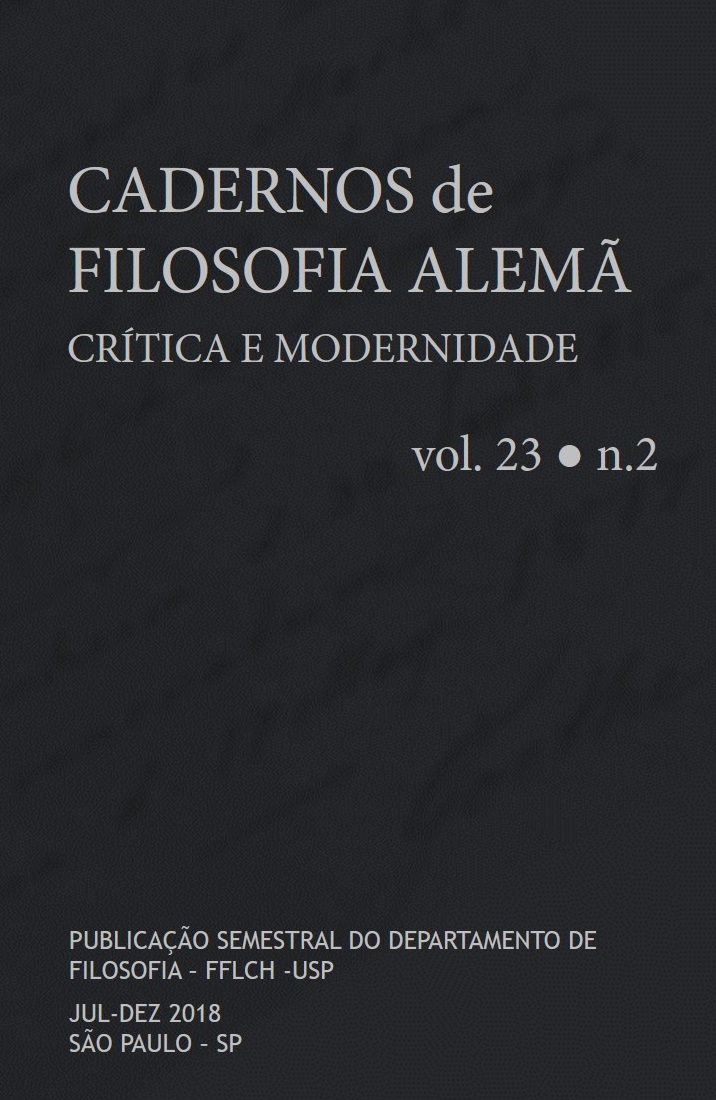Interrogating Western Modernity: Postcolonial Reflections on Occidental Claims and Action
DOI:
https://doi.org/10.11606/issn.2318-9800.v23i2p35-52Palabras clave:
teorias pós e decoloniais, desconstrução, humanismo, modernidade ocidental, esclarecimentoResumen
This paper deals with the way in which European modernity, and the West more generally, are reflected upon in the field of post- and decolonial theories, which generally question those representations of the European/Western tradition of thought and politics that only focus on their positive aspects, but differ greatly with regard to the way in which they frame and formulate their critique of this tradition. I discuss three major positions in this field. They are characterized by the rejection of Western modernity (Walter Mignolo), by a deconstruction of core text and principles of the European Enlightenment (Gayatri Spivak), and by attempts at a renewal and hence a radicalization of some of its core normative claims, particularly humanism (Achille Mbembe).
Descargas
Referencias
Ashcroft B., Griffiths G. and Tiffin H. (1995). The Post-Colonial Studies Reader. London - New York: Routledge.
Bhambra G.K. (2014). Connected Sociologies. London Bloomsbury.
Braidotti R. (2013). The Posthuman. Cambridge - Malden/MA: Polity.
Fanon F. (2004). The Wretched of the Earth. New York: Grove Press.
Gilligan C. (1982). In a Different Voice. Psychological Theory and Women’s Development. Cambridge/MA - London: Harvard University Press.
Gilroy P. (2011). Fanon and the Value of the Human. The Johannesburg Salon, 7-14. (http://jwtc.org.za/volume_14/paul_gilroy.htm [access: November 18th 2018]).
____________. (2012). Fanon’s postcolonial cosmopolitanism. European Journal of Social Theory, 16, pp.208-225.
____________. (2016). Postcolonial Thought and Social Theory. Oxford - New York: Oxford University Press.
Grandin G. (2007). Empire’s Workshop. Latin America, the United States, and the Rise of the New Imperialism. New York: Holt.
Haraway D. (2016). Staying with the Trouble. Making Kin in the Chthulucene. Durham: Duke University Press.
Kerner I. (2012). Postkoloniale Theorien zur Einführung. Hamburg: Junius.
____________. (2014). “Countering the Legacies of Colonial Racism – Delinking and the Renewal of Humanism”. In: Broeck S. and Junker C. (eds.). Postcoloniality – Decoloniality – Black Critique: Joints and Fissures. Frankfurt/M. - New York: Campus, pp.145-158.
____________. (2017). Universalismus: Ansprüche, Probleme und Potentiale. ARCH+, 50, pp. 8-11.
Larrabee M.J. (1993). An Ethic of Care. Feminist and Interdisciplinary Perspectives. London - New York: Routledge.
Les Convivialistes (2014). Convivialist Manifesto. A declaration of interdependence (Global Dialogues 3). Duisburg: Käte Hamburger Kolleg / Centre for Global Cooperation Research (KHK/GCR21).
Loomba A. (2005). Colonialism/Postcolonialism. Second Edition. London - New York: Routledge.
Mbembe A. (2001). On the Postcolony. Berkeley - Los Angeles: University of California Press.
____________. (2009). Postcolonial Thought Explained to the French. The Johannesburg Salon: pp. 34-39 (http://www.jwtc.org.za/the_salon/volume_31/achille_mbembe.htm).
____________. (2010). Sortir de la Grande Nuit. Essai sur l’Afrique décolonisée. Paris: Découverte.
____________. (2012). Metamorphic Thought: The Works of Frantz Fanon. African Studies, 71, pp. 19-28.
____________. (2017). Critique of Black Reason. Durham - London: Duke University Press.
Mignolo W. (2005). The Idea of Latin America. Malden - Oxford: Blackwell.
____________. (2010). Local Histories/Global Designs. Coloniality, Subaltern Knowledges, and Border Thinking. Princeton: Princeton University Press.
____________. (2011a). The Darker Side of Western Modernity. Global Futures, Decolonial Options. Durham - London: Duke University Press.
____________. (2011b). Geopolitics of Sensing and Knowing. On (De)Coloniality, Border Thinking, and Epistemic Disobedience. transversal (http://eipcp.net/transversal/0112/mignolo/en/print: 1-9).
____________. (2012). Epistemischer Ungehorsam. Rhetorik der Moderne, Logik der Kolonialität und Grammatik der Dekolonialität. Wien - Berlin: Turia + Kant.
Mignolo W. and Walsh C. (2018). On Decoloniality. Concepts, Analytics, Praxis. Durham - London: Duke University Press.
Moraña M., Dussel E. and Jáuregui C. (2008). Colonialism and its Replicants. In: Moraña M., Dussel E. and Jáuregui C. (eds.). Coloniality at Large. Latin America and the Postcolonial Debate. Durham - London: Duke University Press, pp.1-20.
Persram N. (2007). Postcolonialism and Political Theory. Lanham - Plymouth: Lexington.
Quijano A. (2000). Coloniality of Power, Eurocentrism, and Latin America. Nepantla, 1, pp. 533-580.
____________. (2007). Coloniality as Modernity/Rationality. Cultural Studies, 21, pp. 168-178.
Seth S. (2013). Postcolonial Theory and International Relations. A critical Introduction. London - New York: Routledge.
Spivak G.C. (1988). Can the Subaltern Speak? In: Nelson C. and Grossberg L. (eds.). Marxism and the Interpretation of Culture. Urbana - Chicago: University of Illinois Press, pp.272-313.
____________. (1996). Bonding in Difference. Interview with Alfred Artega. In: Landry D. and MacLean G. (eds.). The Spivak Reader. London - New York: Routledge, pp.15-28.
____________. (1999). A Critique of Postcolonial Reason. Toward a History of the Vanishing Present. Cambridge, Mass – London: Harvard University Press.
____________. (2008). Other Asias. Malden - Oxford: Blackwell.
Descargas
Publicado
Número
Sección
Licencia
As informações e conceitos emitidos em textos são de absoluta responsabilidade de seus autores.
Todos os artigos anteriores a 5 de julho de 2018 e posteriores a julho de 2021 estão licenciados sob uma licença CC BY-NC-ND, exceto os publicados entre as datas mencionadas, que estão sob a licença CC BY-NC-SA. A permissão para tradução por terceiros do material publicado sob a licença CC BY-NC-ND poderá ser obtida com o consentimento do autor ou autora.
Políticas de acesso aberto - Diadorim


